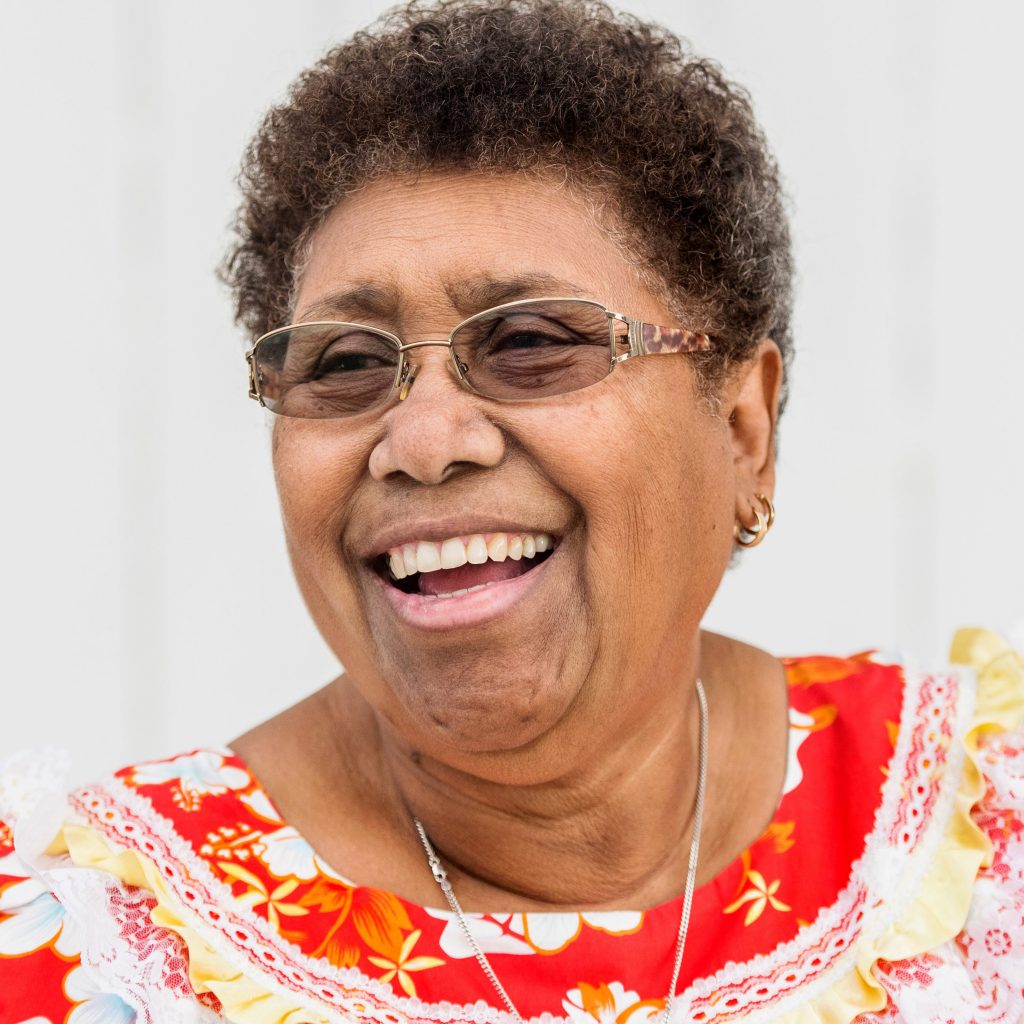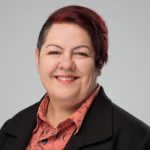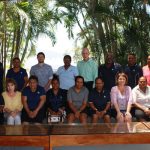
When times are tough, it’s Mothers who pick up the pieces and keep the family together. We need to make sure young women get the support and respect they need to be good Mums.
I’m a Torres Strait Islander and was born on Thursday Island but raised on Moa Island – in those days it was an Anglican mission, so that’s where I grew up.
I was raised on Moa Island and once I finished Grade 7, there were no more educational opportunities for me so I began to work around the island.
The Government opened its first High School on Thursday Island in 1964, so this gave me the opportunity to further my education.
When I finished High School, my Uncle was on the hospital board and he got me the job at the Thursday Island hospital as a Clerk and I started there at the age of 18.
I met my husband, Nigel Tillett, while working at the hospital. He’s from England but was raised in Australia. He was with the Queensland Government’s Department of Aboriginal and Islander Affairs.
Once we were married, he took me away from my island and we travelled across Far North Queensland Aboriginal communities with his job. During that time, we had four beautiful kids – three boys and one girl.
I live in Cairns now. We resided in the Torres Strait for a while, but once the kids began to start High School, we made the decision to come settle in Cairns. That was back in 1986 and I had to find a job because we had to pay the house loan and everything and so I worked with the Aboriginal and Torres Strait Women’s Shelter called Warringu.
I worked there for six years then went to the Cairns Base Hospital as an Aboriginal and Torres Strait Islander liaison officer.
I spent thirty years working in child safety but I’m nearing 70 now so I’m going to step back.
At the moment, I’m sitting on the Mental Health Review Tribunal as a community member one day a week.

How do you celebrate NAIDOC Week?
We really get involved with NAIDOC Week though cooking bush tucker. At the Hospital, I join the other workers to cook kangaroo and island food and display it proudly. We take pride in feeding the staff and encouraging them to try the food. We also promote Aboriginal culture throughout the day.
Also, when new staff come into the hospital they have to do orientation so I get involved with the orientation, telling them about the Aboriginal and Islander patients that come in there, what are their needs and what to look out for, their culture, stuff like that. When it comes to child safety, I’m also there with cultural support for the staff too.
I had the opportunity to recruit and support foster carers and I really enjoyed that. Later on my job became involved in actually going in and removing kids. I really feel bad that I went in there and removed kids, even if it was for their own good. But to look back now, I think that we could have helped the parents, especially the Mothers, to do better and be able to leave the kids there or with the Grandmother. That’s my only disappointment that I didn’t do more to go that way.
Later in life, I got a degree in Applied Science in Primary Indigenous Health so that helped me on the health side of things. I also got another degree in Community Welfare. This study and experience taught me one thing – we have to focus on early intervention in certain communities, especially in the Cape and Torres Strait.
What does NAIDOC Week mean to you?
It’s just to promote Aboriginal and Islanders, what do we stand for, what do we want to do and what are we going to do.
And showing them that we can do those things and our younger generation should be given the opportunity to develop themselves but some are, some go to University and get their degree, they’re in good places and some of them start their own businesses.
When I was working from 1980s to 1990s, we were really struggling back then and people were still trying to find, overcrowding in Cairns and, you talk about self-determination but nothing really happened but things have changed slowly.
We actually do have something, the NAIDOC is much better now that we get a little bit more money and we can do things, more promotions. In a different way. And I’m really pleased that the government seems to have embraced that cross cultural stuff in the workplace.
At the hospital there, they are doing a good things with promoting Aboriginal and Islander customs, practices. Identifying that this is their land, this is Aboriginal land. This with same with the Torres Strait Islanders too.
How did you support Aboriginal and Torres Strait Islander women?
Mainly being there for them when the need it – especially if they are running away from Domestic and Family Violence. These women leave their partners or husbands and it was my job to let them know that they’re safe with us – to let them know the places they can go for more help in the community.
And especially to support the kids too as they’ve been through a bit of trauma.
When we helped women, sometimes they would come back for support. Sometimes they would go and we wouldn’t know what happened to them. But we feel that we did some good, especially when we see some of the women that visited Shelter all those years ago as Grandmothers now.
They come forward and say to me:
Thank you Ada for doing that for me.
That’s the feedback and that’s the honour I get. They come and say thank you for all that I helped them with. Whether that was finding another place for them to live, going with them to the court house, or taking them to the hospital when they get injured.
I’m proud to say I’m still with Warringu as a Member of the Board of Directors.
I’ve been in the sector so long, that I’ve often helped three generations of women, both through my role at Warringu, at the Hospital, and through homelessness outreach.
Every time I walk in town and these women see me, whether it is the Grandmother, Mother, or younger daughter, they see me and they acknowledge me. Some of the grandchildren have done well and I’m really pleased that they have done well that good things have happened. Some of them have their own little family and they got housing too.
There’s much better housing now in Cairns for our people and they can get it and access housing through different agencies. In the 1980s and 1990s it was very hard.
I reflect and I feel good about what I’ve done. I want to let these women know that I’m still available if they want to talk and yarn, that’s why I still get involved with the Warringu side, the directorship side. So, if any of the women want to talk, they usually look for me to talk to.
Did anyone inspire you throughout your career?
Jenny Marten, we lived and worked at Warringu together – we were together for a long time. She’s my stable mate there. We worked together, we argued, we cried, but we’re still friends even now.
I’d also like to recognise Jeanette Singleton.
Jeanette, Jenny, and I all worked together at the shelter and formed a good friendship. I must say, I really depend on Jeanette and Jenny for their local knowledge of Cairns and the families we served.
We really relied on each other for professional support. We need to be knowledgeable about the shelter, the domestic violence stuff, we didn’t have that much. We could just bumble through it and support each other through what we can manage, to keep the women safe. We feel sometimes that we haven’t given much. Because we don’t have it here, we don’t have those safe houses and that’s how we struggle.
What message do you have for Aboriginal and Torres Strait Islander women this NAIDOC Week?
Mothers and Grandmothers are the main link in the family. When times are tough, it’s Mothers who pick up the pieces and keep the family together. We need to make sure young women get the support and respect they need to be good Mums.


